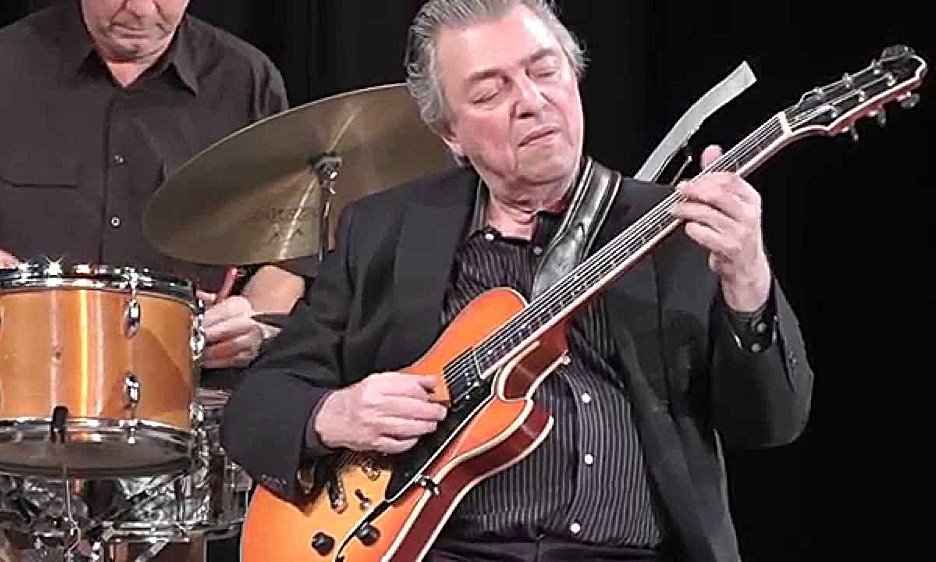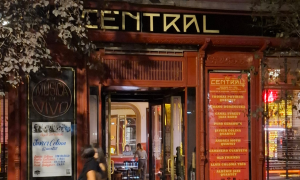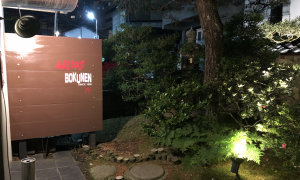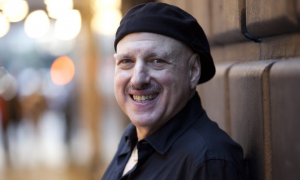Home » Jazz Articles » The Jazz Life » Scenes From The Life Of A Young Jazz Musician
Scenes From The Life Of A Young Jazz Musician

'Who is this guy?' I thought. I knew I’d seen him somewhere before, not in movies or on TV, but in some major media event. He danced pretty badly so I couldn’t help thinking, he must be a musician.
—Jack Wilkins
Foreword
Jack Wilkins is an iconic jazz guitarists of the 1970s who is still playing his ass off today, after a career leading and accompanying a host of groups with musicians such as Stan Getz, Buddy Rich, Dizzy Gillespie, Lionel Hampton, Jimmy McGriff, Zoot Sims, Sonny Stitt, Eddie Gomez, Jack DeJohnette, Phil Woods, and the Brecker Brothers to mention just a handful. One thing about Jack that many people don't know was that as young musician he also played vibes professionally. He can often be found playing jazz dates around Manhattan when he's not touring, and has an enviable reputation as a teacher and recording artist. I'm proud to call him one of my closest friends. Which is how I persuaded him to let me publish this little piece for All About Jazz.
—Peter Rubie
It was a typical post-Christmas and New Year's tourist night in The Big Apple. My first record as a leader (Windows) had come out several years earlier, and I had been a sidesman on records by Lionel Hampton, Buddy Rich, and Earl Hines since then. I was working on recording and releasing a new one as a leader (You Can't Live Without It).
Viewed from the top of the World Trade Center's recently opened restaurant "Windows on the World," a newly-born 1977 New York City looked positively breathtaking. The landmark restaurant had opened as a private club the year before, and was quite literally a dining room in the clouds, located on the 107th floor of the North Tower of the World Trade Center. It offered guests almost 360 degree giddy, large picture window views of Manhattan, Brooklyn and New Jersey all within a swivel of your head. When the wind picked up you could sometimes feel the building sway slightly under you. Which was vaguely disturbing if you weren't expecting it.
One blustery, cold January night, however, I was viewing it from a different perspective— as a guitarist in a trio with piano and bass. It was a grueling gig. The hours were long, the music was in a commercial vein, and everyone eating seemed too busy talking to be listening. I was okay accepting the job, because, like many musicians I was feeling the pinch after the holiday festivities. January is often a lean earnings month. Because of the weather not many people were about. The job reminded me of a cartoon in the British magazine Punch someone once told me about. An intense-looking pianist dressed in a tux is entertaining a room full of diners and snooty waiters. If you looked carefully at the music stand you could see the title of the piece he was playing: "Choke You Bastards," by Cole Porter.
My friend Carl Barry usually played the gig six nights a week, but every now and then he would take a night off to do a better-paying job and hire me to sub for him. Carl would always pay me a little more than the gig paid to make it worth my while. Since I was able to play the gig "on autopilot," I got in the habit of watching couples as they danced, and eavesdropped on conversations from tables near the bandstand. The club, which at that time had about 1,500 members, was a playground for the wealthy and connected. You could witness a young man trying to impress a date, an elderly couple unabashedly dancing a 1920s Foxtrot, or tourists from the Midwest being intimidated by a waiter. You had to be prepared for anything there.
The job started at 7:30 pm which was too early for me to eat, but by 12:30 am when we closed up shop I'd be pretty hungry, especially since the restaurant served pretty good food and exotic aromas drifted my way all evening. The policy at the restaurant was, "No free food or drink for the musicians." It remains one of the more quaint customs in the music business even to this day. To buy something would have cost as much as I was earning, so I decided to wait till 12:30 am when I finished playing.
Around 12:10 am when most of the patrons where on their way out, there was a bit of a commotion at the entrance. Several waiters scampered about in the near empty room and a table was quickly set up in a remote part of the club. I noticed a group of about eight people. The men, all dressed in tuxedos, seemed very protective and attentive to the needs of a well-dressed woman. One of the men in particular appeared to accompany the woman. The others seemed to be some sort of entourage. After the couple was seated, the entourage men made themselves scarce by standing in the shadows of the romantic restaurant lighting to the side of the table the couple were seated at, glancing around from time to time. By now I was praying for the magic hour of 12:30 am to arrive so I could leave and get something to eat. I wasn't too interested in observing the newcomers because I was tired and hungry at this point. The pianist was the bandleader and at about 12:15 am one of the entourage came over and whispered something to him. He nodded, then leaned over towards the bassist and me and said, "We have to play a little longer." I stared at him in disbelief!
I didn't want to create a scene, so I said nothing. We continued to play some conventional dance music—you know the kind of thing I'm sure, very stiff, no feeling. The couple got up to dance.
They looked familiar to me, especially him. He was lean and tall with kinky hair, meticulously dressed in a tailored evening suit and black tie. He had that cultured international Playboy air that we recognized from watching TV and movies, and seemed very much at home. I remember noticing his hands, which had long, expressive fingers. "Who is this guy?" I thought. I knew I'd seen him somewhere before, not in movies or on TV, but in some major media event. He danced pretty badly so I couldn't help thinking, he must be a musician. The woman was dark, elegant, and beautiful. Her hands were adorned with large shiny stones that were no doubt real gems. She could have been some kind of queen, obviously very wealthy. After working at the restaurant for a while, you got to the point where you could tell pretty quickly who was really wealthy and who was just trying to make an impression.
The minutes dragged on as the couple danced. It was all very respectable. He was a bit younger than she, but it wasn't a mother-son kind of thing. They genuinely seemed to enjoy each other's company. I still couldn't figure out who they were, so I tried to catch the pianist's eye to mouth the words, "Who are they?" He purposely ignored me and just kept smiling and playing. The bassist laughed because he had recognized them and was amused at my perplexed state. After a while I forgot about them and started thinking, "Just wait 'til I get hold of Carl and blast him for giving me this job and causing me to play overtime—and on an empty stomach as well!
Eventually the couple returned to their table to drink $500 bottles of champagne and consume $800 jars of caviar. "How gross!" I thought. It wasn't envy. I just couldn't get my head around such ostentatious living, even if I had been able to afford it. I yearned to go home and get something normal to eat.
Finally, at 1:30 am, the leader said, "Okay, that's it for tonight." An hour over. I was particularly hungry and pretty aggravated by then, because I figured there wouldn't be any extra money. Everyone seemed so obsequious and intimidated. "Who are these people?" I asked again.
The bandleader aggressively said, "Shhhhh!" and told me to wait, which didn't help my mood.
As I was putting my guitar in its case, someone from the couple's entourage came over and made a point of shaking each of our hands, thanking us, and handing each of us an elegant white envelope. I thanked him back, and put the envelope in my pocket, not thinking much more about it. It was really starting to bug me who these people were.
After the couple left I said to the leader, "Ok, what goes here? Who were they?"
He said, "Didn't you recognize them? That was Imelda Marcos of the Philippines and Van Cliburn, the pianist."
"Well, no wonder he couldn't dance," I said. We all had a good laugh and talked about the money they must have spent that night—close to $8,000 we figured. I dashed home, forgetting about the envelope until I took off my jacket and it fell to the floor. "Oh how nice," I thought, "my $20.00 tip no doubt." When I opened it up I wasn't prepared for what I found inside—five crisp new $100 bills. They had paid me $500 for an hour of overtime!
I began to reflect on the whole evening—the $500 bottles of champagne, the $800 jars of caviar, the salaries for the entourage of bodyguards, the small amount of "extra" money Carl was making at his other gig, and the relatively small amount I had expected for filling in for him at this one. What was wrong with this picture? Carl was struggling to make a little more for his family, and I was playing for what seemed like hours on end while Mrs. Marcos and Van Cliburn were spending $8,000 or so for an hour of fun. Sure, I was delighted to get the money. Who wouldn't be?
But still, I began to think about the dire situation in the Philippines and other parts of the world, the race rioting we'd had in Queens and Boston not so long ago, people starving almost everywhere. Meanwhile... Oh well, just another night in New York City.
I think I'll buy a $500 bottle of champagne.
Tags
The Jazz Life
Peter Rubie
Jack Wilkins
Buddy Rich
Brecker Brothers
Carl Barry
Van Cliburn
Jack DeJohnette
Phil Woods
eddie gomez
Sonny Stitt
Stan Getz
Dizzy Gillespie
Zoot Sims
Jimmy McGriff
Lionel Hampton
PREVIOUS / NEXT
Support All About Jazz
 All About Jazz has been a pillar of jazz since 1995, championing it as an art form and, more importantly, supporting the musicians who make it. Our enduring commitment has made "AAJ" one of the most culturally important websites of its kind, read by hundreds of thousands of fans, musicians and industry figures every month.
All About Jazz has been a pillar of jazz since 1995, championing it as an art form and, more importantly, supporting the musicians who make it. Our enduring commitment has made "AAJ" one of the most culturally important websites of its kind, read by hundreds of thousands of fans, musicians and industry figures every month.
























